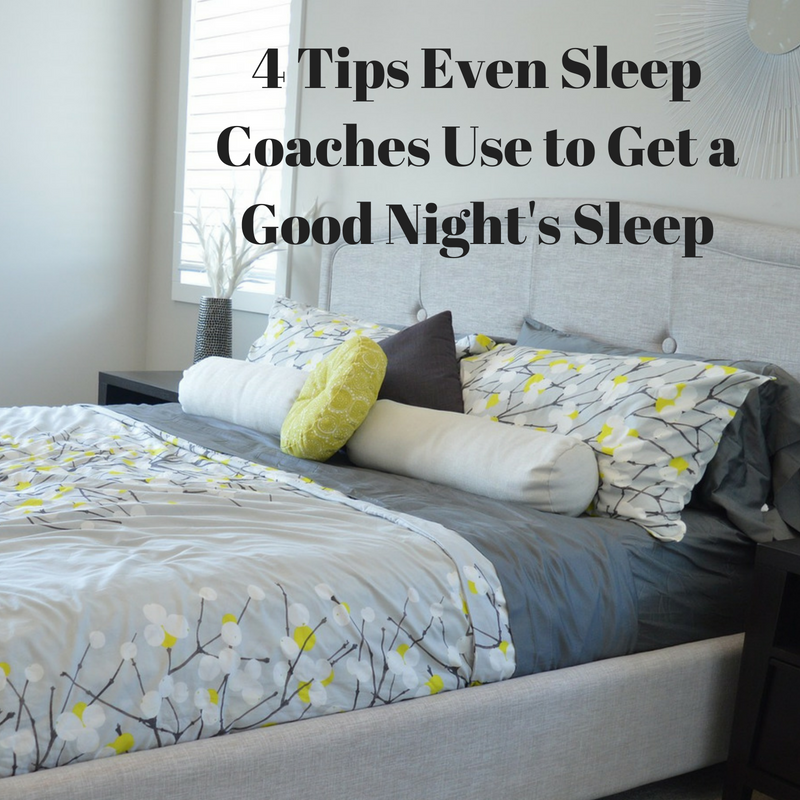I’m here to make a confession. Yes, I’m a sleep coach but I too have rough nights of sleep.
It doesn’t happen often but I know how you feel. It’s 3am and you’re staring at the clock. You have a few hours before you have to get up for work and you’re worried how you’ll get through the day on so little sleep. You feel like your nights are on repeat…falling asleep but not staying asleep. Or you’re the opposite…you lay in bed and can’t seem to fall asleep no matter what you do.
So what can you do to make your nights more restful? Do these 4 things to help you drift off to sleep faster and feel more rested in the morning.
1) Learn ways to deal with your stress
Stress is something we all have to deal with. It’s good and it’s bad but face it, we all have it. Work deadlines, home maintenance, dealing with family drama and the driver in front of you that stopped a little too quickly on the way home. Stress happens but you have to learn how to deal with it instead of letting it eat at you.
It’s not easy to just make time for yourself to relax and let the stress of the day go. And it only takes 5 minutes. Sit quietly and just close your eyes. Let all of your worries go away and take 4 long, slow deep breaths.
Stressed about how you’ll get everything done on your to-do list today? Do the same 5 minute breathing exercise but then take a few extra minutes to prioritize the rest of your day. Spend 10 minutes thinking about what you need to do today and why it should be at the top of your priority list. At the end of those 10 minutes, make a decision and go for it. Having a plan will leave you less stressed.
What other healthy ways can you measure stress? Number 1 for me is to exercise. I get it daily and I don’t let anything stand in my way, even if it’s a short walk at lunchtime. I also get a chance to prioritize the rest of my day, so it’s a win-win.
2) Work now or work tomorrow
Learning to set boundaries between yourself and your work are not easy. Technology keeps us connected with others around the world and many of us have started working from home, but at what cost? We schedule phone calls at 11pm so we can reach overseas customers but don’t consider what it’s doing to our own sleep. We sent emails because we happen to be awake in the middle of the night and all we can think about is a project we’re working on.
Have you found yourself working on that project a few more minutes to make some extra progress only to find yourself still working an hour or two later? Set limits for yourself and put ‘getting enough sleep’ at the top of your priority list. Simply changing the way we work and managing our own boundaries around how much we decide to work during the day can help us rest better at night.
3) Do something productive before bed
And I don’t mean checking Facebook or Instagram to watch the latest silly video your friend posted…turn off screens…that means no TV, phone or computer time… 30 minutes before you head to bed. Give your brain a chance to wind down from the day and time to produce your own natural melatonin to help you drift off to sleep. There’s always something to do around the house that doesn’t require a screen like doing some quick cleanup, spending time talking with your spouse/partner or even just reading a good old fashioned book.
Listening to a book or podcast is ok, just don’t scroll through your news feed while you’re doing it.
4) Figure out how much sleep you REALLY need
Ideally, adults need to get 7-8 hours of sleep each night. We’re all a little different and have different sleep needs. So how do you figure out what’s your ideal amount of sleep? Try this hack: commit to spending one week going to bed at the same time.
Follow the tips above and go to bed at the same time every night, ideally by 10pm, or earlier if that’s what your regular bedtime is. Note the times you sleep and when you wake up in the morning and don’t rely on your watch or sleep tracker (that’s a topic for another post). After a few days, see if you notice a pattern. Also, note how you feel throughout the day and how tired you are at bedtime. Use all of that information to help you decide if you need more sleep than you’ve been getting and set your new bedtime.
It’s all about creating a regular routine for yourself and your sleep needs. Knowing how much sleep you need and making it a priority will be more rested and sleep better at night.
Christine Stevens is a sleep consultant for tired professionals and adults that want more sleep but don’t know how to get it. Learn more or get in touch with her by visiting www.sleepsolutionsbychristine.com


